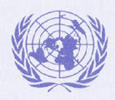



We request the readers of these pages to write to the Secretary-general of the UN, Mr. Kofi Annan, and urge him to support Taiwan's entry into the UN.
During the past few years, the months of September and October have become the highlight for the annual "Taiwan into the UN" campaign. Right now, a world body which was set up on the basis of the principle of universality is still excluding a free, democratic and independent nation of 21 million people.
The establishment of the United Nations in 1945 started a new era and long series of declarations of independence in Asia and Africa. Because of a fluke accident of history -- the occupation of Taiwan by Chiang Kai-shek's armies fleeing from China -- the Taiwanese people were not able to join the international family of nations as an independent nation right away.
Over the past four decades, the Taiwanese have, through their hard work and ingenuity, achieved one of the most prosperous economies of East Asia, and also brought about an almost full-fledged democracy. If we may paraphrase Christopher Reeve's speech at the Democratic Convention in Chicago: "Taiwanese frequently achieve the impossible."
Some international observers argue that we should not raise the Taiwan issue, saying that Taiwan's entry into the UN is impossible because China has a permanent seat in the Security Council and will block any attempt to let Taiwan join the UN.
We believe that such a position is indefensible and totally wrong: the world should not let itself be intimidated by a repressive and dictatorial China. It should stand up for the principles on which the UN was founded: freedom, democracy, equal rights and self-determination of peoples.
In particular Western nations, which seem so eager to trade with China, have the moral obligation to make it clear to China that its acceptance as a full partner in the international community hinges on its recognition of Taiwan as a friendly neighbor.
It needs to be emphasized time and again that Taiwan fulfills all basic requirements of a nation-state: it has a defined territory, a population of 21 million (greater than that of three quarters of the UN member nations), and a government which exercises effective control over the territory and the population.
Why is it important that this de-facto independent country becomes a member of the UN ? First, because of the original principles of the UN itself: the world body was founded on the principles of universality and self-determination. If the UN is to survive as an institution that safeguards world peace, it is essential that it adheres to these principles, and apply them to the case of Taiwan.
A second reason for supporting Taiwan's membership in the UN is that this further emphasizes that Taiwan's future is an international issue, to be dealt with by the international community, and not an "internal problem" for the "Chinese on both sides of the Taiwan Straits" to decide on. The responsibility of the international community stems from the San Francisco Peace Treaty of 1952, which decided that Japan ceded its sovereignty over Taiwan, and that the future status of Taiwan was to be decided in due time "in accord with the purposes and principles of the Charter of the United Nations." Certainly in those days, this term could have only one meaning: "independence."
A third reason for supporting Taiwan's entry into the UN is that over the past decade Taiwan has -- due to the hard work of the democratic opposition and the overseas Taiwanese community -- achieved a democratic political system. This argument is especially relevant for the United States and Europe. It would be indefensible, for the West to deny UN membership to a free and democratic nation, while condoning the presence of repressive, undemocratic nations such as China, Iraq, Iran, etc. This would be a flagrant violation of basic democratic principles.
It needs to be emphasized strongly that this new Taiwan is totally different from the old so-called "Republic of China" which was kicked out of the United Nations in 1971. As we argued before: Resolution 2758 dealt with the question who was representing China in the United Nations. It did not deal with the question of Taiwan's representation, which is a separate issue, to be dealt with as a follow up on the decisions of the San Francisco Peace Treaty of 1951-52.
For China, the new Taiwan is thus not the old rival from the days of the Chinese Civil War on the mainland (a myth perpetuated by the Kuomintang authorities for many decades), but a new neighbor, which wants to live in peace with all its neighbors, including the big brother across the Straits.
We thus appeal to the rest of the world, and particularly the United States and Europe, to live up to the principles of universality and democracy on which the United Nations were founded, accept Taiwan as a full and equal partner, and recognize it under the heading of a new "One Taiwan, One China" policy.
A new "One Taiwan, One China" policy would not alter international recognition of the government in Beijing as the rulers of mainland China, but it should specifically refer to the provisions of the San Francisco Peace Treaty of 1952, in which the members of the United Nations decided that "...the future status of Taiwan will be decided in accord with the purposes and principles of the Charter of the United Nations".
As part of this new policy, the international community needs to express clearly that:
Back to: Taiwan, Ilha Formosa home page
Last updated on 22 March 1997.